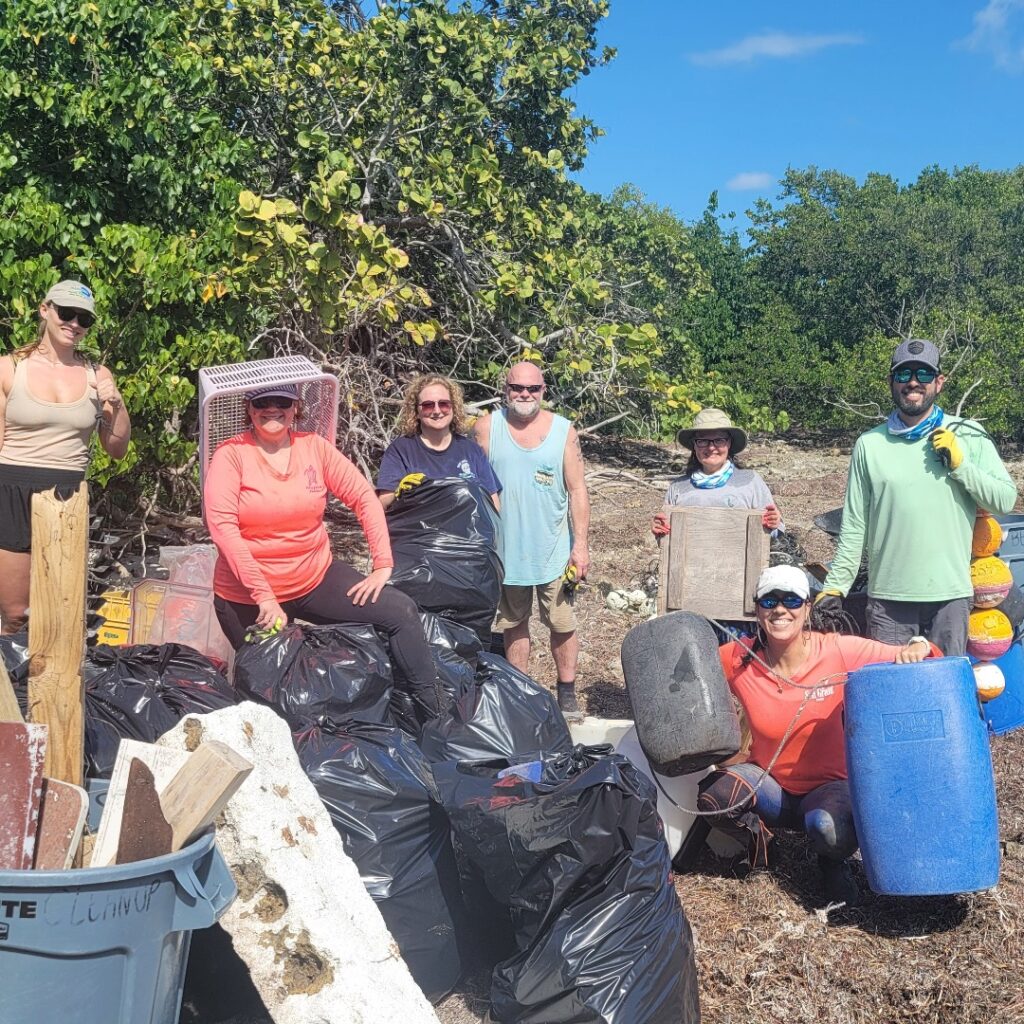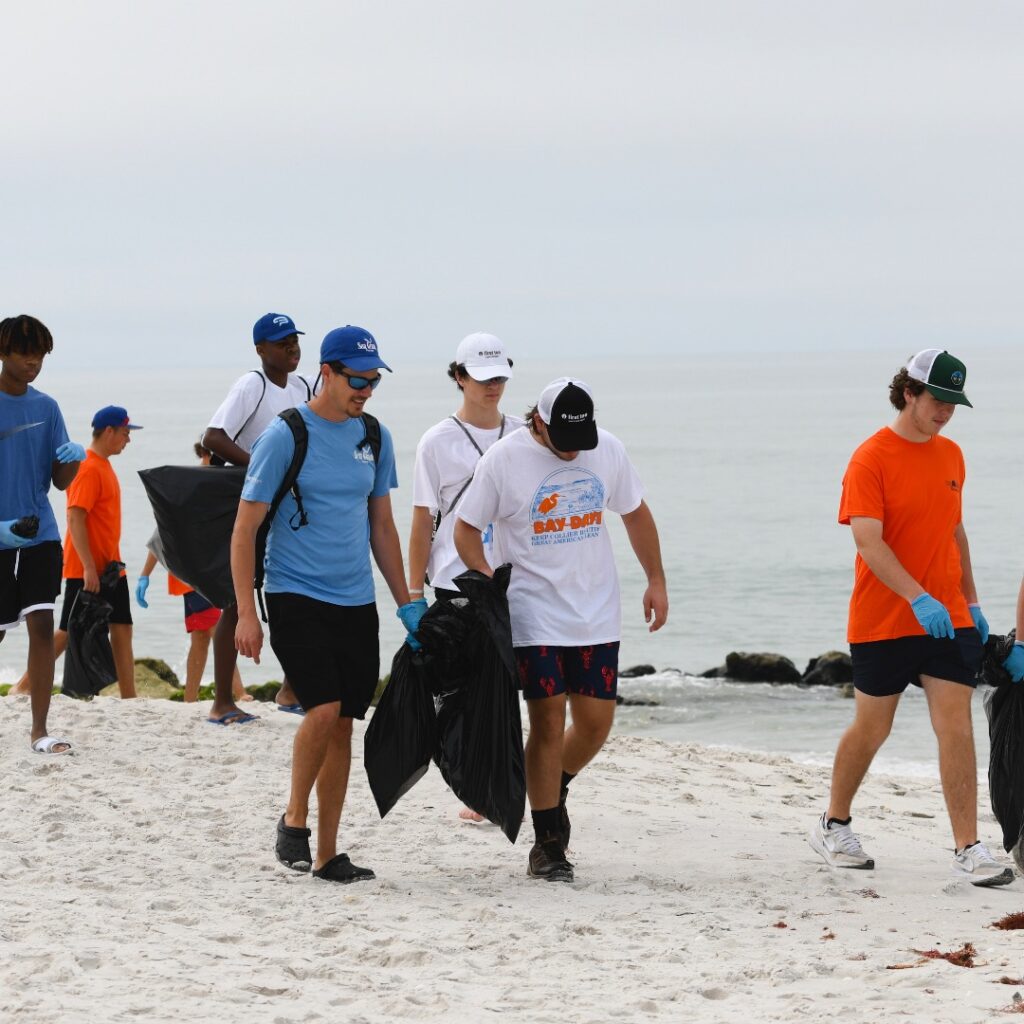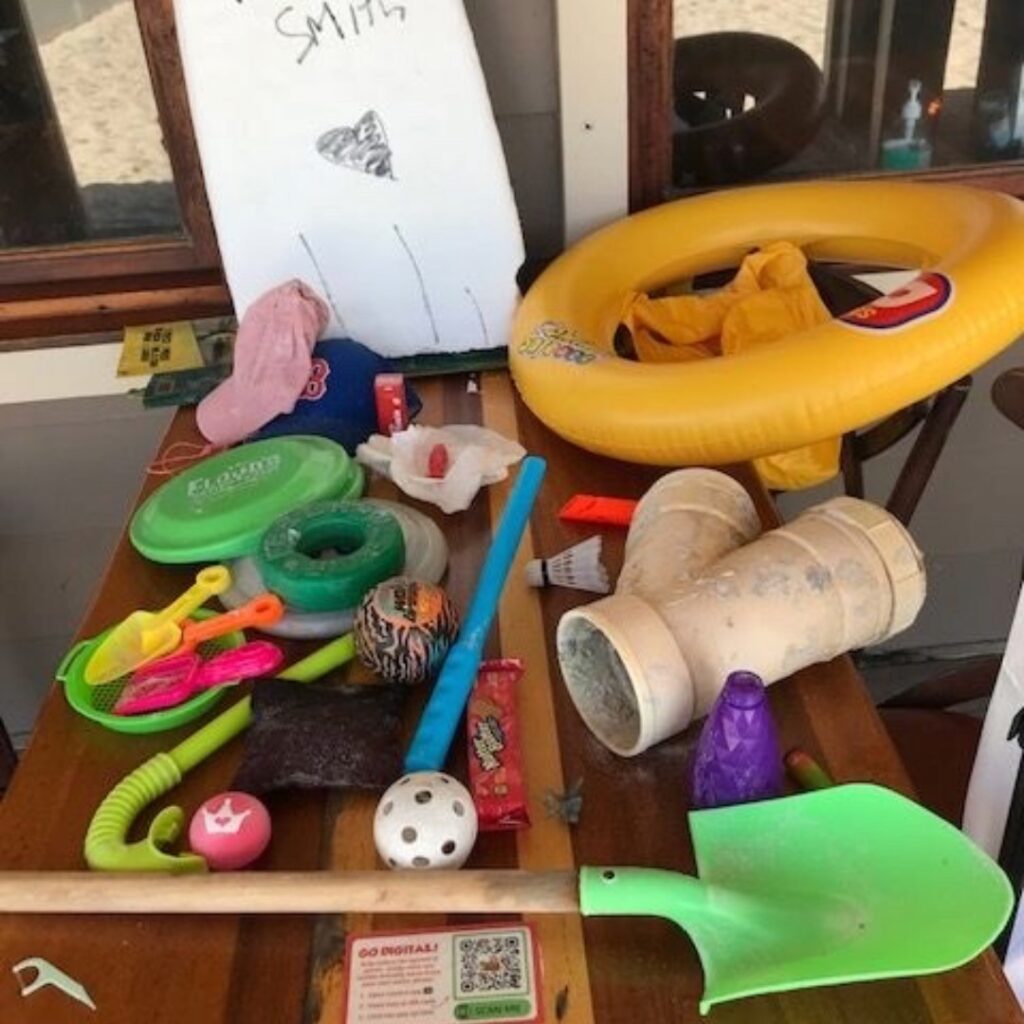
ICC event at Biscayne Bay National Park. Image courtesy of Ana Zangroniz.
Need a post-Labor Day holiday to celebrate on the beach? Join your local Florida Sea Grant county extension agent on September 16th for the biggest coastal cleanup of the year!
For over 30 years, the Ocean Conservancy has organized the International Coastal Cleanup (ICC), an event that encourages beachgoers and volunteers around the globe to collect and document trash that can impede local waterways.
Coastal cleanups can support healthy marine and ocean ecosystems, enhance environmental stewardship, strengthen community collaboration, and gather data to help guide the decisions of policymakers and scientists. As part of the International Coastal Cleanup Day event, volunteers can easily catalog each item of trash collected using the Ocean Conservancy’s Clean Swell App.
The regional aspect of ICC events is also essential, especially as each of Florida’s coastal counties experiences different sources of debris and trash; some areas are more susceptible to trash from tourism and recreational activities, while other counties deal with debris from hurricane impacts or both.
The Ocean Conservancy depends mainly on local partners to host cleanups around the United States and the world. This year, Florida Sea Grant’s county extension agents are hosting cleanup events with partners throughout Florida.
Florida Sea Grant Cleanups
Hernando County
Brittney Hall-Scharf, Hernando County UF/IFAS Florida Sea Grant Extension Agent, is participating in her seventh cleanup event in Hernando County at Linda Pederson Park this year. Last year, Hernando County volunteers removed 9,837 pieces of debris, including 140 pounds of recycling and 900 pounds of trash. The most collected items were food wrappers, beverage cans, cigarette butts, plastic and glass beverage bottles, and other plastic products such as bags, containers, and personal protection (face masks, wipes, gloves).
“The results from the cleanup show the impacts within the community. The debris left behind demonstrates how land-based and water-based activities are connected”, says Hall-Scharf.
Hernando County community members are diligent in sustaining environmental cleanup efforts. Past coastal cleanups have inspired locals to take the initiative in preventing debris and trash accumulation:
- County Commissioner Allocco participated in the cleanup and shared his findings and concerns regarding cigarette butt debris with the Board of County Commissioners and the community.
- A girl scout designed her Gold Award project around creating public service announcements on the different pathways debris can enter the waterways.
- A local high school student started a campaign throughout local parks to keep the food wrappers, bags, and beverage bottles from blowing out of the trash cans and entering coastal systems and the Weeki Wachee River.
- A large group of Boy Scouts adopted the dredge islands that line the main channel leading out to the Gulf of Mexico, and organize cleanups.
“The annual cleanup in Hernando brings the community together. When I started doing the cleanups, only 20ish people would turn out but now we average 200-250. Many students and families come out and volunteer together. Local businesses donate items and funds to cover the supplies needed to support the volunteer efforts. And most of all, it helps make the community a better place.”
Find out more about Hernando County’s upcoming ICC event and registration here.
Levy County
Savanna Barry, Regional Specialized Sea Grant Agent, will be participating in her eighth cleanup at the Cedar Key City Marine. In 2022, nearly 300 volunteers turned out to remove almost 4,000 pounds of trash from 20 miles of local shorelines around the main island and offshore keys surrounding Cedar Keys. Cleanup efforts are crucial for the estuarine habitats and the National Wildlife Refuge surrounding the main island.
In previous years, the island has encountered the impacts of debris and trash left from storms.
“This year, and in any year we have storm surge, hurricane debris is a big concern. However, even in a non-storm year, there is a lot of debris generated from fishing, tourism, and aquaculture. This annual event is also an important part of Cedar Key’s clean marina program.”
The Cedar Key cleanup demonstrates the effectiveness of documenting trash and debris types, as they compare to global trends.
In 2020-2022, global data showed nine out of ten trash items were plastic. In 2021, 6 out of the top 10 items in Cedar Key trash were plastic, and in 2022, at least 8 out of the top 10 items collected were plastic and a good portion of rope.
With this information, decision-makers can address preventative actions for target products and items.
Most of the collected trash is sorted and weighed. In the past, the county has partnered with TerraCycle to recycle some of the plastics, and some locals have even found a way to harness their creative outlet; a Cedar Key artist collects as much glass as she can for future projects!
Find out more about Levy County’s upcoming ICC event and registration here.
By participating in activities such as cleanups, we are improving habitats for marine life, water quality, and our local economy.
Mike Sipos
Miami-Dade County
Ana Zangroniz, Miami-Dade County UF/IFAS Florida Sea Grant Extension Agent, is hosting her sixth ICC event with Biscayne National Park. This unique cleanup is held at Elliot Key which is located eight miles off the shore of Miami-Dade County.
“The biggest and most meaningful impact is that my event participants get to see how much boat-based debris accumulates on the oceanside of the island where we do our cleanups. Since the site is 8 miles offshore of Miami-Dade County, items found are from land but rather boat-based and shipping activities. Items such as flip-flops, appliances, massive PVC pipes, and recreational and commercial fishing gear, such as gillnets, lobster traps, traplines, and buoys are found.”
In addition to this area being a protected, untreated natural area, these sites host sea turtle nesting. The beaches are very narrow, causing debris accumulation to impede a female turtle’s progress onto the beach to lay her clutch of eggs or stop her from nesting altogether.
Items that can be repurposed such as lobster trap line, intact Styrofoam buoys, usable milk crates, or five-gallon buckets, are done so through a partnership with a non-profit, Coastal Cleanup Corporation (CCC). A portion of CCC proceeds are donated to the Biscayne National Park.
Recently, the Biscayne Beach Cleanup (BBC) volunteer program that Zangroniz volunteers with at Biscayne National Park, were selected as the national award recipient of the George and Helen Hartzog Innovation Award for Outstanding Volunteer Service.
For Zangroniz, the greatest achievement is seeing how the event translates to transformational learning for volunteers.
“It is one thing to know you picked up 350 plastic bottle caps, but another thing to see it on paper. The great majority of the participants make thoughtful observations about plastic and other litter items and better understand the monumental task of maintaining these beaches. Many are inspired to make changes to their daily habits, like not purchasing bottled water. Several have returned for other ICC and debris events I organized or volunteered with me in other capacities. It’s an honor to be able to host this cleanup with Biscayne National Park.”
Find out more about Miami-Dade County’s upcoming ICC event and registration here.

Mike Sipos alongside volunteers at a coastal cleanup in Collier County. Image courtesy of Mike Sipos.
Collier County
Mike Sipos, Collier County UF/IFAS Florida Sea Grant Extension Agent, will oversee the upcoming ICC event as a site captain at Clam Pass in Naples, Florida.
“One of the largest drivers for visitors to come to Southwest Florida is the beach and natural areas; this means they get a lot of use and a lot of potential debris accumulation. We want to help our environment be used and enjoyed by so many folks. By participating in activities such as cleanups, we are improving the habitats for marine life, water quality, and our local economy,” says Sipos.
While it may be his first time participating in ICC, Sipos is a veteran coordinator and participant in coastal cleanups; some prior cleanup experiences have even involved diving and paddling! His experiences equip him with extensive knowledge of debris types and their impacts on coastal and marine ecosystems.
“If I were to estimate the amount of debris that was collected during cleanups I have participated in, it would be in the hundreds, if not thousands of pounds. However, weight does not always correlate with impact. Anchors and construction materials such as a cinder block or board can be heavy and in some cases pretty inert, but these materials can damage sensitive environments. Smaller debris like degrading plastic containers, buoys, cast nets, wrappers, monofilament or nylon line may weigh less but could be ingested or marine animals may become entangled, causing death or health concerns for marine organisms.”
Sipos also emphasizes that the types of coastal debris and trash can depend on other factors such as location, time of the year, and whether the cleanup is hosted post-Hurricane season.
“On a typical beach cleanup, the debris may be lots of plastic bags, cans, bottles, fishing equipment, ropes, cigarette buts, food containers, beach toys, and more. Post-hurricane, you could find items found on the first floors of coastal homes on the beach! This included paint cans, doors, couches, furniture, LED lightbulbs, water bottles, and more.”
Find out more about Collier County’s upcoming ICC event and registration here.

Items collected during coastal cleanup event in Walton County. Image courtesy of Laura Tiu.
Okaloosa and Walton County
Laura Tiu, Walton County UF/IFAS Florida Sea Grant Extension Agent, participates in her local ICC event in partnership with Okaloosa and Walton Counties.
“Our beaches are a huge economic driver of our local economy. We are in a high tourist area and many of our cleanup events are sponsored and located by beachfront restaurants. This means a lot of straws, bottle caps, plastic lids, and beach toys.”
On Tiu’s side of the coast, ICC is more than a cleanup event; it’s an annual tradition that brings small coastal communities together to share some fun in the sun!
“We have a contest each year at the Walton County Location at the Surf Hut restaurant for the most cigarette butts collected.”
The event removes hundreds of pounds of beach debris, keeping it from getting into the Gulf of Mexico. For Tiu, the beach cleanups also allow her to educate visitors and residents about preserving our natural resources, and the impact of microplastics on the environment, and allow folks to give back to their communities.
“ I love seeing the volunteers that return every year for our events, especially the families. It’s fun to watch the kids grow over the years and see how dedicated they are to the event.”
Find out more about Walton and Okaloosa Counties upcoming ICC events and registration here.
Don’t see your county agent participating in the International Coastal Cleanup? Check out the Ocean Conservancy map to find nearby ICC events. Most importantly, take action before the cleanup! One man’s trash is not always another man’s treasure, so make sure to always pick up your trash with proper disposal, and opt for reusable items and products to make your beach trip fun and healthy.